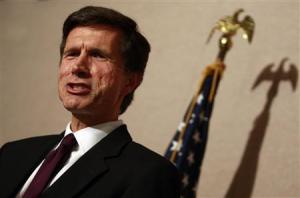By Oliver Meier in Berlin
The German government believes that Chinese plans to export two nuclear reactors to Pakistan are covered by the existing policies and understandings of the Nuclear Suppliers Group (NSG) and that the 46-nation export control organization should not even discuss the deal at its meeting this week in the Netherlands.
In response to a set of questions asked by opposition Social Democrat members of the German Bundestag on Germany's nuclear export control policies, the government explained that it views the planned export of the Chashma 3 and 4 nuclear reactors to Pakistan are covered by the "grandfathering" clause of the NSG because the deal had been agreed before China joined the NSG in 2004.
According to NSG guidelines, NSG members can only export nuclear technology to states that put all their nuclear facilities under nuclear safeguards. Pakistan, which is not a member of the Nuclear Nonproliferation Treaty and has been the source of many illicit nuclear transfers in the past, does not satisfy this comprehensive safeguards requirement.
However, Beijing is citing a loophole in NSG rules which permits states to complete trade deals that were agreed before joining the group. Experts doubt whether this "grandfathering" clause can be applied to the planned construction of the two additional reactors at Chasma. Fred McGoldrick explained the background in the January/February issue of Arms Control Today:
China now is citing the grandfather clause as justification for its planned assistance to Pakistan's civil nuclear reactors. In a formal "declaration of existing projects" made at the time it joined the NSG in 2004, Beijing informed the NSG of its 1991 cooperation agreement with Pakistan under which it had supplied a 300-megawatt reactor at Chashma and had just undertaken to supply an additional 325-megawatt reactor at the same location. The Chinese claimed that the supply of these reactors did not constitute a "new" supply commitment and therefore was grandfathered under the NSG comprehensive safeguards guideline. This was a dubious claim at the time because the 1991 Chinese-Pakistani pact was a general framework agreement and reportedly did not contain an actual commitment to supply reactors at Chashma. In any event, Beijing's 2004 explanations to the NSG did not mention grandfathering any more reactors under the 1991 agreement. Thus, the proposed supply of additional nuclear plants at the Chashma site would not be covered by the 1991 agreement, would not be grandfathered under the NSG guidelines, and clearly would violate the commitments China made when joining the NSG in 2004—a position that the United States has adopted.
Berlin's new stance therefore puts it at odds with the Obama administration both with regard to the legality of the transfer and the necessity for deal to be approved by the NSG.
 Assistant Secretary of State for South and Central Asian Affairs Robert Blake (Image Source: Reuters)
Assistant Secretary of State for South and Central Asian Affairs Robert Blake (Image Source: Reuters)
On March 18, Assistant Secretary of State for South and Central Asian Affairs Robert Blake had told reporters in Beijing that "We expect China to abide by the commitments that it made when it joined the Nuclear Suppliers Group in 2004, and in particular we think the construction of new nuclear reactors such as the Chasma 3 and 4 would be inconsistent with those commitments."
By contrast, the German government response to the Bundestag says "China can export nuclear goods for construction of nuclear power plants Chashma 3 and 4 to Pakistan without violating NSG guidelines."
In addition, Germany argues that "China has explained its position on existing export agreements when it joined the NSG". The German government's response to the Bundestag states "on the basis of the explanations provided by China", the German government assumes that "the planned exports of reactors from China to Pakistan do not require a separate decision by the NSG."
However, a State Department official told Arms Control Today on March 23: "We believe the Nuclear Suppliers Group is the appropriate venue to discuss concerns about this transfer."
The statement by Germany came on the eve of the annual meeting of NSG members, which is taking place this week in Nordwiijk, Netherlands. The controversial Chinese-Pakistani reactor deal, which was revealed last year and discussed at the 2010 NSG meeting at Christchurch, New Zealand, will be among the key issues discussed at this week's meeting. Presumably, Germany has come to the conclusion that the deal between China and Pakistan cannot be prevented anyway and that sticking to nonproliferation principles would not only be futile but also harmful to Sino-German trade relations.
Uta Zapf, chair of the subcommittee on disarmament, arms control and disarmament in the Bundestag, one of those members of Parliament behind the inquiry called this behavior "reckless". She said that "German Foreign Minister Westerwelle's talk about strengthening nonproliferation rules is contradicted by his deeds. If we don't oppose this deal between an important NSG member and one of the most notorious proliferators of nuclear technology, which deal will Germany stand against in the future?"
